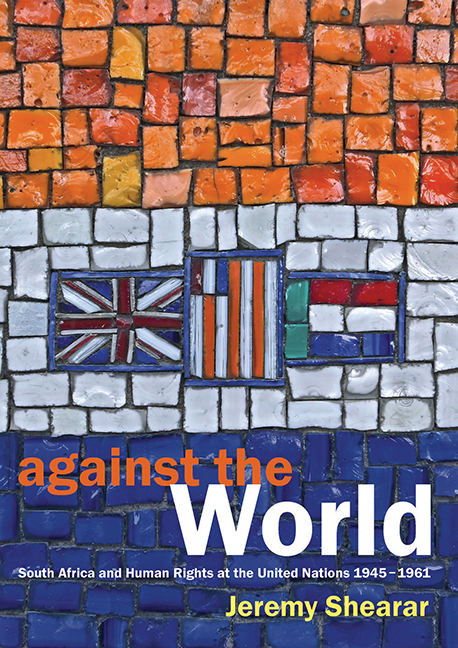Book contents
- Frontmatter
- Contents
- Acknowledgements
- Abbreviations
- Introduction: ‘What we have lost is all the more reason for cherishing what survives’
- 1 Quod severis metes: Birth of the United Nations
- Chapter 2 South African Indians
- 3 Universal Declaration of Human Rights
- 4 International covenants on human rights
- 5 United Nations surveys of human rights issues
- 6 Evolution of human rights at the United Nations
- 7 State sovereignty at issue
- 8 Apartheid on the agenda
- 9 Shadow of Sharpeville
- 10 General relations with the United Nations
- 11 Concluding observations
- Appendix: Selected provisions of the United Nations Charter
- Sources and references
- Index
6 - Evolution of human rights at the United Nations
Published online by Cambridge University Press: 19 March 2020
- Frontmatter
- Contents
- Acknowledgements
- Abbreviations
- Introduction: ‘What we have lost is all the more reason for cherishing what survives’
- 1 Quod severis metes: Birth of the United Nations
- Chapter 2 South African Indians
- 3 Universal Declaration of Human Rights
- 4 International covenants on human rights
- 5 United Nations surveys of human rights issues
- 6 Evolution of human rights at the United Nations
- 7 State sovereignty at issue
- 8 Apartheid on the agenda
- 9 Shadow of Sharpeville
- 10 General relations with the United Nations
- 11 Concluding observations
- Appendix: Selected provisions of the United Nations Charter
- Sources and references
- Index
Summary
Introduction
Human rights issues became a constant theme at the UN to complement its primary role of maintaining international peace and security. Certain of these issues have been touched on in the previous three chapters. Some others which also impacted in various ways on SA's relations with the organisation are discussed below. The first, relating to the rights and duties of states, covers the time frame both before and after the 1948 elections. The second, on the rights of women and children, highlights the problems SA officials experienced in dealing with issues where the Union could be exposed to allegations of discrimination. The third, covering refugees and their right to asylum, demonstrates how the SA government's attitude towards humanitarian issues was perceived by the rest of the world. Finally, the question of self-determination and the right of colonial peoples to independence is considered in the context of the equation of SA's domestic policies with colonialism by much of the international community.
Rights and duties of states
In tandem with its statement of essential rights, which served as the basis for the preparation and adoption of the UDHR, Panama proposed a draft Declaration of the Rights and Duties of Nations to the 1st GA. The draft was passed to member states for review. The SA law advisers had no comment but, as the DEA felt that there was a political advantage in submitting SA's views, it asked them to reconsider. Certain items seemed to be of interest. The law advisers’ response was sour: ‘When we are asked to comment on a matter … we examine its legal aspects, having regard to the special interests of the Union. The statement, therefore, that we have no comments to offer, follows upon such examination and signifies that in our opinion there is neither an illegality nor an endangering of the Union.’ International law, they said, allowed for divergent opinions and legal principles were made to fit political facts rather than government policies being adapted to a uniform international legal code.
The law advisers did, however, accede to the DEA's request. Their opinion did not relate to human rights per se, but made two points in that context. Firstly, the word ‘state’ had different meanings in different countries and times.
- Type
- Chapter
- Information
- Against the WorldSouth Africa and Human Rights at the United Nations 1945–1961, pp. 131 - 149Publisher: University of South AfricaPrint publication year: 2017



